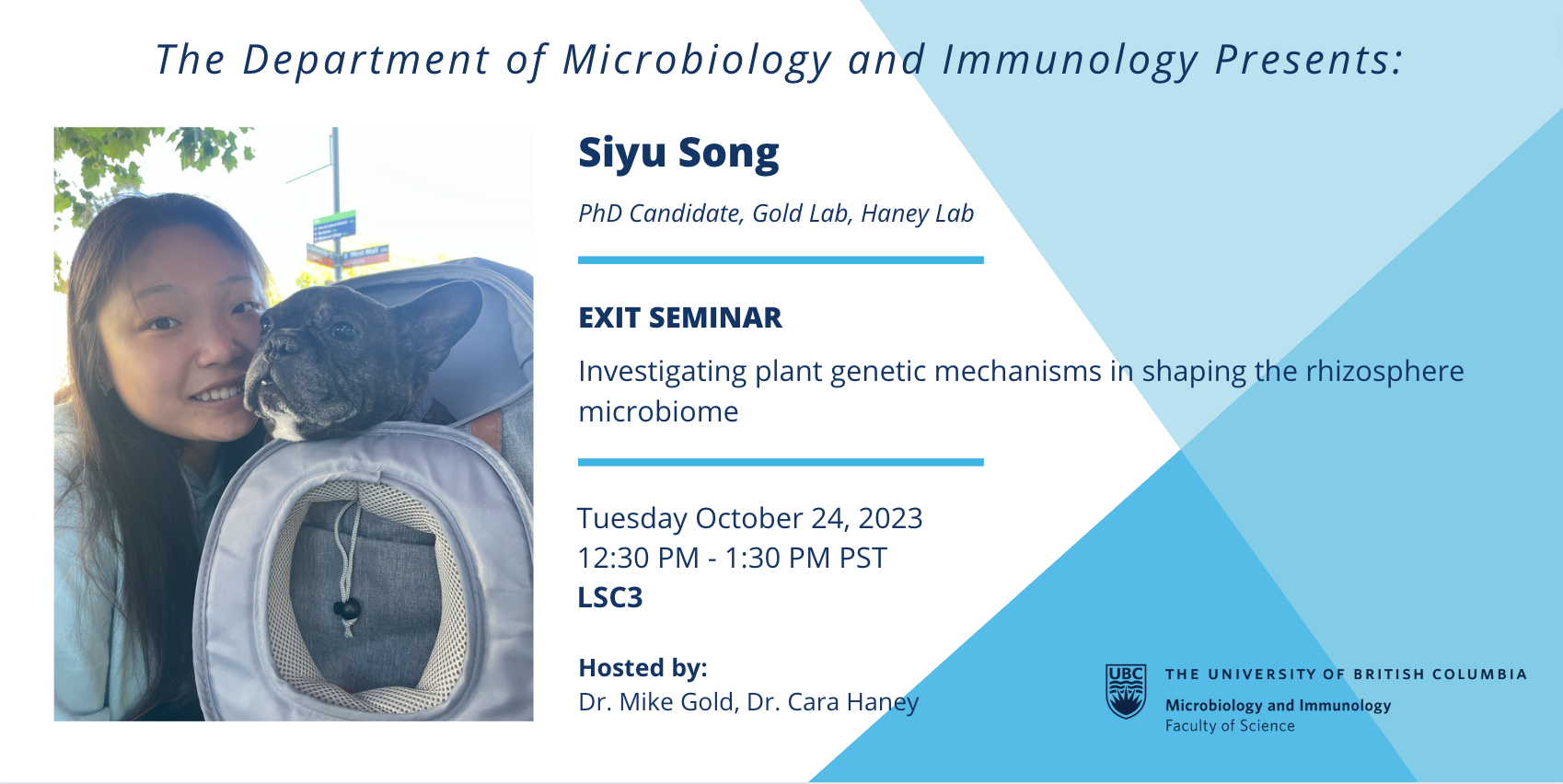
Seminar Title: Investigating plant genetic mechanisms in shaping the rhizosphere microbiome
Abstract: Plant roots associate with diverse microbes recruited from the soil known as the rhizosphere microbiome, which provide plants with a variety of benefits including nutrient uptake, improved plant growth, and protection from pathogens. A delicate balance must be maintained between beneficial bacteria and plant immune responses to prevent issues like dysbiosis and opportunistic diseases. Whether microbiota can induce autoimmunity in plants, and the genetic mechanisms that would normally prevent this, remain to be investigated. Here we show that Arabidopsis pskr1 (phytosulfokine receptor 1) loss-of-function mutants display autoimmunity and reduced rhizosphere bacterial growth when inoculated with normally growth-promoting Pseudomonas fluorescens. Notably, through 16S rRNA microbiome sequencing and colonization test with taxonomically diverse synthetic communities (SynComs) strains, we found PSKR1 shifts the rhizosphere microbiome composition by predominately regulating Pseudomonas abundance. Transcriptional profiling demonstrated that PSKR1 regulates the plant growth-defense trade-off during plant-microbiome interactions: PSKR1 upregulates plant photosynthesis and root growth but suppresses salicylic acid (SA)-mediated defense responses. Furthermore, a transgenic reporter reveals that P. fluorescens induces PSKR1 expression in roots, suggesting that it manipulates plant signaling to promote colonization. Collectively, our results demonstrate a plant-rhizosphere commensal dialogue and a genetic mechanism to coordinate beneficial functions of the microbiome while preventing autoimmunity.
Through fine-tuning immune responses and regulating metabolic processes, plants strive to establish a beneficial association with rhizosphere microbiome members, thereby enhancing their adaptability to various biotic and abiotic stresses. Through a reverse-genetic approach, we identified an Arabidopsis lrx1/2 (leucine-rich repeat extensins 1/ leucine-rich repeat extensins 2) mutant with enriched rhizosphere P. fluorescens under natural soil conditions. Remarkably, the lrx1/2 mutant exhibited a phosphate starvation growth deficiency phenotype in a rhizosphere microbiome-dependent manner, suggesting that LRX1/2 is involved in shaping the rhizosphere microbiome in adaptation to phosphate stress.
Altogether, the results I obtained from my Ph.D. work highlighted the novel plant genetic mechanisms involved in regulating the rhizosphere commensals, and expanded our knowledge in understanding the sophisticated plant-microbiome conversations.
Life Sciences Centre, LSC 3 - 2350 Health Sciences Mall MBIM itsupport@microbiology.ubc.ca America/Vancouver publicSeminar Title: Investigating plant genetic mechanisms in shaping the rhizosphere microbiome
Abstract: Plant roots associate with diverse microbes recruited from the soil known as the rhizosphere microbiome, which provide plants with a variety of benefits including nutrient uptake, improved plant growth, and protection from pathogens. A delicate balance must be maintained between beneficial bacteria and plant immune responses to prevent issues like dysbiosis and opportunistic diseases. Whether microbiota can induce autoimmunity in plants, and the genetic mechanisms that would normally prevent this, remain to be investigated. Here we show that Arabidopsis pskr1 (phytosulfokine receptor 1) loss-of-function mutants display autoimmunity and reduced rhizosphere bacterial growth when inoculated with normally growth-promoting Pseudomonas fluorescens. Notably, through 16S rRNA microbiome sequencing and colonization test with taxonomically diverse synthetic communities (SynComs) strains, we found PSKR1 shifts the rhizosphere microbiome composition by predominately regulating Pseudomonas abundance. Transcriptional profiling demonstrated that PSKR1 regulates the plant growth-defense trade-off during plant-microbiome interactions: PSKR1 upregulates plant photosynthesis and root growth but suppresses salicylic acid (SA)-mediated defense responses. Furthermore, a transgenic reporter reveals that P. fluorescens induces PSKR1 expression in roots, suggesting that it manipulates plant signaling to promote colonization. Collectively, our results demonstrate a plant-rhizosphere commensal dialogue and a genetic mechanism to coordinate beneficial functions of the microbiome while preventing autoimmunity.
Through fine-tuning immune responses and regulating metabolic processes, plants strive to establish a beneficial association with rhizosphere microbiome members, thereby enhancing their adaptability to various biotic and abiotic stresses. Through a reverse-genetic approach, we identified an Arabidopsis lrx1/2 (leucine-rich repeat extensins 1/ leucine-rich repeat extensins 2) mutant with enriched rhizosphere P. fluorescens under natural soil conditions. Remarkably, the lrx1/2 mutant exhibited a phosphate starvation growth deficiency phenotype in a rhizosphere microbiome-dependent manner, suggesting that LRX1/2 is involved in shaping the rhizosphere microbiome in adaptation to phosphate stress.
Altogether, the results I obtained from my Ph.D. work highlighted the novel plant genetic mechanisms involved in regulating the rhizosphere commensals, and expanded our knowledge in understanding the sophisticated plant-microbiome conversations.

